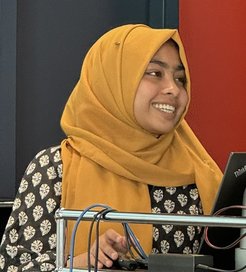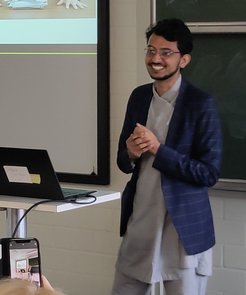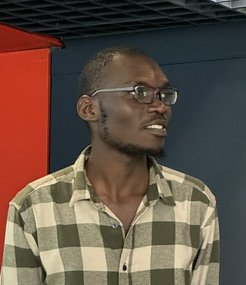Exploring New Horizons: Farewell to the Comp@ss Internship students
Last Thursday, August 22nd, the Comp@ss program culminated in a final seminar and celebration. The students had the opportunity to present their research findings in a series of engaging and thorough scientific talks. Titus Ekbat shared his work on the "Buffer Behavior of Potassium Poly(Heptazine)imide," while Nusrat Jahan presented on "Synergistic Effects of Oxides on Re-Incorporated MOF for Enhanced Dark Hydrogen Evolution." Sujan Bhandari discussed "Learning Quantum Mechanical Time Evolution with Transformers," and Mercy Chaparadza explored the "Investigation of the Dynamic Behavior of MIL-88 Type MOFs." The presentations showcased the depth of their research and the skills they had acquired during their internships.
Prof. Bettina Lotsch, Managing Director of the Institute, expressed her gratitude to the organizers—Dr. Eva Benckiser, Samuel van Gele, and Dr. Zrinka Gattin—for their dedication to the inception and organization of the Comp@ss program. Following the seminar, a lively gathering with food and drinks allowed everyone to celebrate the students’ achievements and reflect on their journey together.

As the Comp@ss internship program at the Max Planck Institute for Solid State Research draws to a close, we take pride in reflecting on the experiences of four exceptional students who have spent the past six months with us. These young researchers, hailing from Zimbabwe, Nepal, Bangladesh, and Kenya, have not only advanced their scientific knowledge but also immersed themselves in the vibrant culture of Stuttgart, forming memories that will stay with them for a lifetime.

For Mercy Chaparadza from Zimbabwe, the journey began with a mix of nervousness and excitement. One of her most cherished memories was delivering her first sub-group presentation in the Krause group meeting. Despite the initial fear, Mercy found herself in a supportive environment that bolstered her confidence. “After the presentation, I felt much more confident and eager to learn more,” she recalls, highlighting how this experience was a turning point, fueling her determination to dive deeper into her research.

Similarly, Nusrat Jahan from Bangladesh remembers the warmth and welcome she received on her very first day, which quickly put her at ease in a new country. The camaraderie she felt only grew stronger during a retreat at Reisenburg Castle, where she bonded with fellow interns over activities like karaoke and treasure hunts. "Those two days were unforgettable," Nusrat reflects, underscoring how these experiences helped her feel connected and at home despite being far from Bangladesh.

Sujan Bhandari from Nepal and Titus Ekbat from Kenya also found their time in Stuttgart to be transformative. For Sujan, the introduction meetup was a standout moment. Dressed in his ethnic attire, he felt a deep sense of pride as he introduced himself and his project to the group. The opportunity to meet and interact with fellow interns and Max Planck FKF officials was both exciting and inspiring, setting the tone for a rewarding internship.

Titus, on the other hand, found immense satisfaction in the collaborative nature of his work. His favorite memory was working on the synthesis and characterization of carbon nitrides, particularly potassium poly(heptazine imide) (KPHI). “The moments when the team came together to solve complex challenges were truly inspiring,” he says, reflecting on the collective effort that made the project so fulfilling.
Throughout their internships, each student acquired valuable skills that will serve them well in their future careers. Mercy, for instance, honed her time management abilities and gained hands-on experience with various laboratory techniques, including PXRD and NMR. Sujan learned the importance of honesty in research, realizing that acknowledging gaps in knowledge and seeking help is key to growth. This lesson was reinforced by the supportive guidance of his supervisor, which helped him build confidence in his abilities.
Nusrat found that working in an international, multicultural team significantly improved her communication skills. Weekly research seminars provided her with a platform to refine her presentation abilities, enabling her to convey complex ideas more clearly. Titus, meanwhile, sharpened his data analysis skills and deepened his understanding of material characterization, particularly in studying how materials behave in different environments.
Living in Stuttgart also exposed the students to cultural contrasts that enriched their experience. Mercy noted the industrialized economy of Stuttgart, driven by giants like Mercedes-Benz and Porsche, as a stark contrast to Zimbabwe’s agriculture-focused economy. She also observed differences in culinary traditions, with German dishes such as Maultaschen and Spätzle standing in contrast to Zimbabwean staples like sadza and nyama.
Sujan was particularly struck by the sheer variety of breads available in Stuttgart—a far cry from the single type of bread he was accustomed to in Nepal. He also appreciated the abundance of green spaces and the city’s health-conscious culture, where jogging and cycling through nature are common weekend activities. Nusrat, too, noticed these differences, finding the casual dress culture and efficient public transportation system in Stuttgart to be refreshing changes from what she was used to in Bangladesh.
As they prepare to leave Stuttgart, each student has valuable advice for future Comp@ss participants. “Trust in your abilities no matter your background,” Mercy advises, emphasizing the importance of asking questions and staying determined. Sujan encourages future students to thoroughly research their projects and supervisors to make the most of their time at the institute. Nusrat, on the other hand, stresses the importance of being proactive and seizing every learning opportunity, while Titus urges students to embrace challenges and step outside their comfort zones.
Looking ahead, all four students are excited about their future prospects. Mercy plans to pursue a PhD in Material Science after completing her master’s degree in Chemistry in Zimbabwe. Sujan, inspired by his work on machine learning and energy storage, also aims to continue his academic journey with a PhD. Nusrat, who was once uncertain about her career path, now has her sights set on a PhD, driven by her newfound passion for research. Titus, who will soon graduate with an MSc in Physics, is eager to further his studies in physics or materials science, focusing on advanced functional materials.
The Comp@ss internship has not only provided these students with invaluable research experience but has also broadened their horizons, both professionally and personally. As they embark on the next steps of their journeys, the memories and skills they’ve gained here at the Max Planck Institute will undoubtedly guide and inspire them.
















